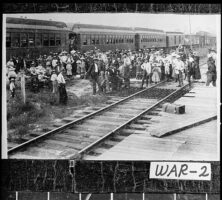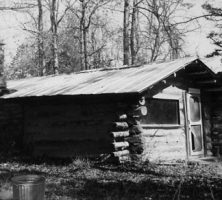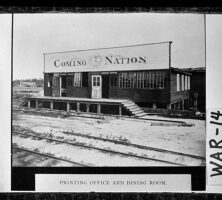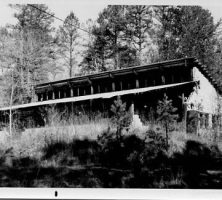Religious, political, and economic utopianism arose in America during the late nineteenth century, at a time when the nation was plagued with economic, social, and cultural problems. Utopian reformers organized communal experiments promoting cooperative and equitable living as a response to the rise of industrial capitalism. In contrast to the utopian movements of the antebellum years, which were mostly confined to the Northeast and Great Lakes regions, the utopian revival after the Civil War (1861-65) was largely centered in the South, which offered a mild climate, cheap land and building materials, and transportation links. Between 1880 and 1960 Georgia was home to several utopian communities.

Photograph by W. Edward Orser
Christian Commonwealth Colony
In 1896 a group of Christian socialists formed the Christian Commonwealth Colony in Muscogee County. Organized by George Howard Gibson of the Christian Corporation in Nebraska and Ralph Albertson of the Willard Colony in North Carolina, the members were drawn together by a sense of Christian brotherhood, a belief in practical Christianity, and a desire to live their convictions fully in a communal setting. The group purchased a failing cotton plantation near Columbus in November 1896, and by 1899 membership had reached ninety-five. Although their cotton mill and towel production venture failed, the colonists successfully printed a periodical called The Social Gospel, which reached at least 2,000 readers. This was not enough, however, to rescue the colony from abysmal living conditions. By 1900, after a typhoid epidemic killed several members, the property was sold, and the proceeds were used to settle debts.
The Duke Colony and Ruskin Commonwealth
The Duke Colony was located in Ware County, about eight miles southwest of Waycross, in a small sawmill town at the edge of the Okefenokee Swamp. It was founded in 1898 when the American Settlers Association, a group of farmers from Ohio and Indiana, moved to the southeast Georgia site and built homes and farms. The colonists individually owned property, but they farmed the 760 acres of land cooperatively.

Courtesy of Georgia Archives.
In 1899 the Duke Colony was joined by more than 100 families, including 240 former members of the recently dissolved Ruskin Colony in Dickson County, Tennessee. Ruskin colonies, which were founded on the ideas of the English social reformer John Ruskin, were attempted in a number of places in America and Europe. The Duke Colony was incorporated under Georgia law as the Ruskin Commonwealth on October 9, 1899, with an incorporation petition stating that the charter request was intended “to establish a community of people on a co-operative basis of Industrial Brotherhood.”

Courtesy of Georgia Archives.
Members of the Ruskin Commonwealth were required to become shareholders in the endeavor, and an elected board of directors ran the colony. At first the new town of Ruskin flourished economically, even publishing its own newspaper, the Coming Nation. However, bad winter weather along with sickness, several damaging fires, and mismanagement doomed the colony by early 1902. Some members stayed, some moved to form a new Ruskin colony in Florida, and others returned north.
Shakers
In 1898 a group of Ohio Shakers, members of the United Society of Believers in the Second Appearance of Christ, purchased land in Brunswick, the seat of Glynn County, and in White Oak, in Camden County. The colony at White Oak became the headquarters of the Georgia Shakers. Although they succeeded in farming, the Shakers could not attract converts, and the colony failed by 1902.
Macedonia Cooperative Community
The Macedonia Cooperative Community was founded in 1937 by liberal southern educator Morris Mitchell in Habersham County, near Clarkesville. It was created as a privately funded version of the federal community resettlement program that taught cooperative living to farmers. Members were shareholders and had equal say in making decisions for the secular community, which was committed to communal living, spiritual searching, and pacifism. A successful dairy herd and Community Playthings, a children’s wooden toy and furniture business, ensured economic survival, but in 1957 the community disbanded when most of its members joined the German-founded, evangelical Society of Brothers communities in New York and Pennsylvania. Community Playthings eventually came under the control of the Society of Brothers, which still runs the enterprise today.

Photograph by W. Edward Orser








